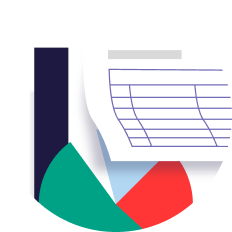Securing a mortgage can be a daunting task for anyone, but for self-employed individuals, the process often presents unique challenges. Unlike traditional W-2 employees who have steady and easily verifiable incomes, self-employed borrowers face fluctuating incomes and must provide extensive documentation to prove their financial stability. This can make the mortgage approval process more complex and intimidating. This article will help mortgage brokers and their clients to find the best mortgage loans for self-employed.
Challenges for Self-Employed Borrowers
Struggling with
a loan scenario?
Get a solution in 30 minutes! Fill out
the short form and get your personal offer
Submit a Scenario
Self-employed individuals face unique challenges when applying for a mortgage compared to traditional W-2 employees. These challenges primarily stem from the nature of self-employment, which often involves variable incomes, complex financial records, and the need for more rigorous documentation to satisfy lenders.
Fluctuating Income
One of the biggest hurdles for self-employed borrowers is income fluctuation. Unlike salaried employees who receive a consistent paycheck, self-employed individuals may experience significant variations in their monthly and yearly earnings. This inconsistency can make it difficult for lenders to assess the borrower’s ability to make regular mortgage payments. Lenders typically prefer steady and predictable income, which means self-employed borrowers must demonstrate long-term income stability through detailed financial records.
Higher Documentation Requirements
Self-employed borrowers must provide more extensive documentation to prove their income and financial health. While W-2 employees often need only recent pay stubs and tax returns, self-employed individuals must furnish multiple years of personal and business tax returns, profit and loss statements, bank statements, and other financial documents. This requirement can be burdensome and time-consuming, particularly for those who do not maintain meticulous records.
Stricter Scrutiny from Lenders
Lenders apply more stringent scrutiny to self-employed applicants due to the perceived higher risk associated with variable incomes and the potential for business downturns. This scrutiny includes a thorough examination of the borrower’s business viability, income consistency, and overall financial health. Lenders may require a detailed explanation of the borrower’s business operations, client base, and future income prospects. Additionally, they might seek CPA letters or client contracts to validate the borrower’s income claims.
Debt-to-Income Ratio Concerns
Self-employed individuals often face challenges in maintaining a favorable debt-to-income (DTI) ratio, which is a crucial factor in mortgage approval. High business expenses and fluctuating incomes can result in a higher DTI ratio, making it harder to qualify for a mortgage. Lenders prefer borrowers with lower DTI ratios, as it indicates better financial management and the ability to handle monthly mortgage payments comfortably.
Impact of Tax Deductions
Self-employed borrowers often take advantage of tax deductions to minimize their taxable income. While this is beneficial for reducing tax liability, it can backfire when applying for a mortgage. A lower reported income due to extensive deductions can make it appear that the borrower has less earning power, potentially affecting their mortgage eligibility.
Necessary Documentation
Get the ADvantage
with our loyalty program
Earn and redeem points for valuable benefits for you and your clients
Unlock Rewards
For self-employed individuals, securing a mortgage requires a more extensive documentation process compared to traditional W-2 employees. Lenders need to see a detailed and accurate financial picture to assess the borrower’s ability to repay the loan. Here are the essential documents that self-employed borrowers must provide:
Personal and Business Tax Returns
Lenders typically require at least two years of personal and business tax returns. These documents are crucial as they offer a comprehensive view of the borrower’s income over time. The tax returns should be complete, including all schedules and attachments. They help mortgage lenders verify that the income reported is consistent and sufficient to meet mortgage payments.
Profit and Loss Statements
These statements are vital for showing the financial performance of the borrower’s business. A profit and loss statement details the revenue, expenses, and profits over a specific period. Lenders use this to assess the health and stability of the business. It is beneficial to include monthly or quarterly statements to provide a more detailed view.
Bank Statements
Lenders generally request several months’ worth of personal and business bank statements. These statements help lenders verify cash flow and ensure that the borrower has sufficient reserves to cover mortgage payments. Consistent deposits and a stable balance can positively influence the lender’s decision.
Employment Verification Documents
Self-employed borrowers need to provide evidence of ongoing business operations. This can include:
- CPA Letters. A letter from a Certified Public Accountant (CPA) can confirm the borrower’s self-employment status and income.
- Client Contracts. Long-term contracts with clients can demonstrate a stable income stream.
- Business Licenses. These licenses validate the legitimacy of the business and its ongoing operations.
Tips for Organizing and Presenting Financial Documents
- Ensure Accuracy. Double-check all documents for accuracy and completeness. Inaccurate or incomplete documents can delay the approval process or lead to a denial.
- Maintain Order. Organize documents in a logical order, such as by date or document type. Using folders or binders can help keep everything neat and easily accessible.
- Provide Summaries. Including a cover letter or executive summary can help lenders quickly understand the key points of your financial situation. Highlight significant achievements, consistent income patterns, and any factors that mitigate income fluctuations.
- Be Transparent. If there are any anomalies or periods of low income, provide explanations. Being upfront about any issues can build trust with the lender and prevent misunderstandings.
- Update Regularly. Keep financial records up-to-date. Lenders prefer the most recent information to make an informed decision.
By carefully preparing and presenting these documents, self-employed borrowers can improve their chances of mortgage approval. Mortgage brokers play a crucial role in this process by guiding their clients on how to organize and submit their financial information effectively. Brokers can ensure that all necessary documentation is accurate, complete, and presented in the best possible light, helping self-employed borrowers with the mortgage application process.
Best Mortgage Loans for Self-Employed
Self-employed borrowers have several mortgage options, each with its own set of requirements, benefits, and potential drawbacks. Understanding these options is crucial for selecting the best mortgage loans for self-employed borrowers’ unique financial situation.
Conventional Loans
- Overview and Requirements. Conventional loans are not backed by the government and typically require a higher credit score, stable income, and a significant down payment. Self-employed borrowers need to provide comprehensive documentation, including two years of tax returns, profit and loss statements, and bank statements.
- Benefits and Drawbacks. The main advantage of conventional loans is the potentially lower interest rates for borrowers with strong credit. However, the stringent income verification can be challenging for self-employed individuals with variable incomes.
FHA Loans
- Explanation. FHA loans are insured by the Federal Housing Administration and designed to help borrowers with less-than-perfect credit or lower down payments.
- Requirements and Benefits. FHA loans require a minimum credit score of 580 and a down payment of as little as 3.5%. They are more lenient regarding income verification, making them suitable for self-employed borrowers who may have difficulty meeting conventional loan requirements. However, FHA loans require mortgage insurance premiums, which can increase overall loan costs.
CHECK OUT FHA LOANS BY AD MORTGAGE
VA Loans
- Eligibility and Benefits. VA loans are available to veterans, active-duty service members, and eligible surviving spouses. They offer several advantages, including no down payment, no private mortgage insurance (PMI), and competitive interest rates.
- Suitability for Self-Employed. Self-employed veterans can benefit from VA loans, but they must still provide detailed financial documentation to demonstrate their income stability.
USDA Loans
- Description. USDA loans are intended for low- to moderate-income borrowers in rural areas. These loans are backed by the U.S. Department of Agriculture and require no down payment.
- Requirements and Benefits. To qualify, the property must be located in a USDA-eligible rural area, and borrowers must meet income eligibility criteria. USDA loans are an excellent option for self-employed borrowers in qualifying areas, offering favorable terms and minimal down payment requirements.
Non-Qualified Mortgages (Non-QM)
- Overview. Non-QM loans are designed for borrowers who do not meet the standard lending criteria of conventional or government-backed loans. These loans offer flexible underwriting standards, making them a viable option for self-employed individuals with unique income situations.
- When to Consider. Non-QM mortgage loans are ideal for self-employed borrowers with irregular income patterns, those who take significant tax deductions, or those with less-than-perfect credit.
- Benefits and Potential Drawbacks. The primary benefit of Non-QM loans is their flexibility in income verification and credit requirements. However, they often come with higher interest rates and fees compared to conventional or government-backed loans.
Selecting the right mortgage product is essential for self-employed borrowers. Mortgage brokers can provide valuable guidance in navigating these options, helping clients understand the benefits and drawbacks of each loan type. By matching borrowers with the appropriate mortgage product, brokers can enhance their clients’ chances of securing a loan that fits their financial situation and homeownership goals.
Tips for Improving Mortgage Approval Chances
Self-employed borrowers can improve their mortgage approval chances by adopting several strategic approaches:
- Maintain a Good Credit Score. A high credit score is crucial for any mortgage application. Self-employed individuals should monitor their credit reports, pay bills on time, and reduce outstanding debt to enhance their creditworthiness.
- Keep Personal and Business Finances Separate. Clearly distinguishing between personal and business expenses helps present a clear financial picture to lenders. Using separate bank accounts and credit cards for business transactions is advisable.
- Ensure a Low Debt-to-Income Ratio. Lenders prefer borrowers with a low debt-to-income (DTI) ratio, as it indicates financial stability and the ability to manage monthly mortgage payments. Self-employed borrowers should aim to reduce their debt and increase their income to achieve a favorable DTI ratio.
- Make a Larger Down Payment. A substantial down payment can offset the perceived risks associated with variable income. It demonstrates the borrower’s commitment and reduces the lender’s risk, potentially leading to better loan terms.
- Consider a Co-Signer or Co-Borrower. Adding a co-signer with a stable income can strengthen the mortgage application. This person’s income and credit profile can complement the self-employed borrower’s financial situation, enhancing approval chances.
- Provide a Comprehensive Business Overview. Lenders need to understand the borrower’s business. A detailed explanation of the business, including its history, client base, and future prospects, can reassure lenders about the stability and viability of the borrower’s income.
By following these tips, self-employed borrowers can present a stronger mortgage application and increase their chances of securing the financing they need. Mortgage brokers can play a pivotal role by guiding their clients through these strategies and helping them prepare a compelling application.
Conclusion
Understanding the unique hurdles self-employed borrowers face, such as fluctuating income and extensive documentation requirements, is the first step in overcoming them. By familiarizing themselves with the various loan options available—such as conventional loans, FHA loans, VA loans, USDA loans, and Non-Qualified Mortgages (Non-QM)—self-employed individuals can identify the best fit for their financial situation.
Mortgage brokers play an essential role in this process. Their expertise and guidance can help get mortgage loans for self-employed borrowers. Brokers can offer tailored advice, assist in organizing financial documents, and match borrowers with the most suitable loan products.
As a mortgage broker, your clients rely on your expertise to find them the best deals. Our Quick Pricer tool can be an invaluable asset in your quest to secure the most advantageous mortgage rates. Be sure to explore our Programs section for additional resources. If you have specific scenarios in mind, don’t hesitate to request them; we’re here to assist you. And if you’re interested in joining forces to provide even more value to your clients, consider becoming a partner and signing a broker package.





